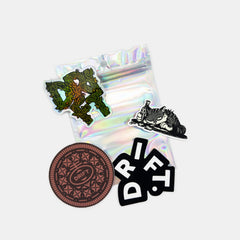This October Bella Union reissued a tenth anniversary edition of Midlake’s The Trials Of Van Occupanther, for our money one of the finest albums of the past 25 years. It actually turned ten years old on 25th July, but placing the pedanticism aside, we got in touch with Tim Smith, the album’s principal writer, producer and singer, to talk about the anniversary and a little about the album’s enduring appeal.
Four years after The Trials of Van Occupanther, Midlake released their fourth studio album The Courage of Others and embarked on their biggest set of live appearances to date, whilst concurrently trying to write and record their fifth LP. Seven Long Suns was never finished, the project was abandoned six months into sessions, and Tim Smith made the decision to leave the band. Midlake subsequently regrouped and released 2013’s Antiphon, whilst Tim moved away and has been working on a new musical project under the name Harp.
Deluxe: Tim, how and where are you?
Tim Smith: I’m living in Kerrville, Texas, in the Texas Hill Country which is about a 6 hour drive from Denton, Texas (home of Midlake and where I spent the last 15 or 20 years of my life). I’m here basically to make a Harp album. So, I spend my days messing with music, very slow process for me, but it’s taking shape gradually.
D: That’s pretty intense.
TS: I’ve become fascinated with the art of fragrance/ perfume lately. That might sound silly but scent is so powerful and very similar to music. Both are invisible, both use notes, both conjure scenes in a person’s mind, both cause a person to feel emotion, and both can strongly trigger one’s memory. It’s just another creative outlet. So I mess around with making horrible-smelling things... it’s very difficult. There’s a whole fragrance/perfume culture out there that most people don’t know about (sounds ridiculous I know).
D: Not ridiculous, but definitely something I’d be terrible at. Rather than ask anything too specific about the Harp project, how about you give me the overview of why you’re doing it and what you, well, anticipate it will sound like...
TS: Let’s get something straight, I’m no amazing musician. By saying that, I’m not trying to degrade myself or be humble. I do have some strengths and can be well confident in the things I excel at but I also have many weaknesses that keep me from making exactly what I want to make. As I started writing and recording songs for Harp it was clear that things weren’t going to be any easier than how they were in Midlake. The only upside is when things aren’t sounding right I don’t have to stand in the way of six bandmates and say “No, let’s try again”.
D: So broadly, where are you with it?
TS: The first batch of Harp songs/ideas just fell a bit flat after trying to record them. They were then put away while a new batch of songs came. I had Paul from Midlake help produce for a few weeks, hired a couple of local musicians. But sadly that also ended up feeling stale as well. Then another batch of songs came and so on. With each batch though, the songs or the way they’re put together comes closer to the vision in my head. That vision too has changed somewhat but not drastically. It’s become clearer, more defined. Songs that I wrote two years ago would seem out of place now with what I want to make and I’m very thankful I didn’t just finish those songs and release that album. Now, the deal is I get pegged as a perfectionist, which I hate. That’s so subjective when talking about music. I certainly don’t want the music I make to be perfect. I want sloppiness, I want mistakes, but most importantly I want heart. When I don’t feel that, then what am I to do? Just put it out anyways because people will like it? It’s as if I were a baker making a chocolate cake and people kept tasting it saying how good it is, that I should stop because it’s already perfect, but the whole time I’m actually trying to make a strawberry cake. People don’t see that, they see someone striving for perfection when all along the intention, the vision, is far from being realized. I think people have some picture of me tinkering with the same 10 songs for three years trying to make them better and better, trying to perfect them into some masterpiece of an album... but it’s nothing like that, that would drive me crazy. It’s me, learning and trying out many different things, I’m no genius, it comes slow. A more accurate way of looking at it would be to imagine I made three albums, but none of them said what I wanted them to say, so I didn’t release them. There’s a sound, or feeling, or vision in my head that I’m trying to get to in making an album, once that’s met then I’ll gladly release it... that might take many more years. It won’t be perfect, it won’t be a masterpiece, but it will hopefully get across this vision/ vibe.
D: Do you feel it to be a supportive drive or perhaps a burden that people are so eager to hear what you are doing as Harp?
TS: As far as pressure from fans or from past work, I don’t really feel any of that. There’s so much awful, meaningless music in the world. It’s so saturated, disposable, and really it’s a bit sickening (especially when you spend hours a day devoted to the subject and see what people are eating up). Whatever I release, some people will like. That’s a fact. And it’s also a fact that some people will hate it, but that won’t bother me as long as I made what I truly wanted to make. The criticisms hit much harder when you can’t help but agree with them. So, as long as the music gets to the heart of what I want then I don’t care how many people like it or hate it. It’s nice to have a huge following but not at the expense of knowing your work really missed the mark. I also don’t hold much of what I’ve done in the past as some great thing that I have to top. Not at all. There’s some good songs, but there’s also much that I’m embarrassed about. I’m confident that whatever I make will be better than what I’ve made in the past. So that’s certainly not an obstacle I deal with.
As far as the sound... it won’t be radically different from what people would expect. Hopefully it’ll have a bit of 70s mellow vibe, slightly medieval, slightly British folk, slightly fantasy, slightly 80s too, so the use of more synths perhaps, but still earthy, we’ll see. It’s just a matter of combining all my loves. Very difficult to find the right combination/balance along with my voice. That’s what the struggle is mostly these days...mixing all these styles into a unified direction.

TS: I still love the greats like Led Zeppelin, Pink Floyd, and Black Sabbath. Also Roy Harper has got to be one of the greatest ever. Love some Incredible String Band, Fairport Convention, Bread Love And Dreams, and Jimmie Spheeris. And I still love some Fleetwood Mac. I was recently turned onto The Cure. Their album Faith... masterpiece... definitely in my top five of all time. That turned me onto many more 80s bands like The Cocteau Twins, The Church, Depeche Mode, The Chameleons, The Wake, Clan Of Xymox, etc.
D: I thought it was very interesting that considering your music has always been tied so heavily to the past, it’s not like you make out that you don’t live in the 21st century. You have a website, you use YouTube, we are emailing… How has the internet impacted you as a music maker and a music consumer?
TS: In a way it’s exciting because you can make something and share or sell it immediately rather than going through all the channels of getting the song/album pressed and put into stores. There are downsides to that, obviously. But it does give hope for anyone who has something to say, to say it freely without needing a ton of money or even a record label behind things. Unfortunately, that causes over-saturation and competition, because now anyone with a computer can make an album and begin fighting for valuable airtime in a listener’s ear. Therefore, we’re bombarded with gimmicky things, hype, advertisements, videos, everyone trying to get their foot in the door, a trillion songs and growing and much of it sounds the same. I’m guilty as well, but at least I take 10 years between albums. Oh well, at the end of the day the consumer can make up their own mind about what moves them, what they buy, what they steal. And steal they will. I’m not innocent in that area either, as a consumer. But I do have a rule that ‘If I love it I must buy it’. I think that’s the key to any illegal downloading or even streaming sites like Spotify or Apple Music...if you start to love it then buy the song/ album to support the artist. I do miss the old days when if you wanted an album you could try and tape it off the radio or make a cassette tape in real time of something your friend owned. Eventually though you’d have to buy it if you loved it because the sound of the actual record was so much better than your recorded cassette. These days if you want a copy then you can have one in a matter of seconds and it will sound exactly the same. It’s far too easy and that’s not good news for people who make music for a living.
D: When was the last time you listened to Van Occupanther, and how did it make you feel?
TS: I haven’t listened to the entire album in probably 10 years, but I did hear some the other day while collecting thoughts for a different interview. Gotta say it didn’t sound as good as I remembered it. It certainly has a unique character though and evokes a certain world, but to me it’s a bit embarrassing in places.
D: Was there a point where you felt proud of that album? of those songs?
TS: For me, it’s like reading an old diary. That was us, our struggles, figuring things out, still very new to things... but we were committed and believed in what we were making. I don’t want to dog it too much because I know there are some brilliant moments on it too. I still think Head Home is really great. I know that album has meant a lot to many people. I wish I could hear it that way. I do remember being proud of it when we finished. I remember being thrilled when Roscoe leaked before the album was released and we received news that lots of people were digging it. Then when I started doing interviews early on about it, I could tell we were going to be able to move up a notch with that album. And so we did, where finally people at the shows were actually singing along with our songs! That feels pretty good.
D: Does it feel like a decade has passed since that record was released?
TS: It actually feels much longer.
D: (laughing) When did you really first start to feel that album was taking shape?
TS: I think once Roscoe was recorded (which was probably many months into the process) we felt this album stood a much better chance than our previous one of getting recognition. That song made us more aware of our potential, I think. It strengthened us, excited us, and gave us more direction. It was a song that could draw a listener in immediately.
D: With Roscoe... it felt like it really caught fire and opened the door for not only yourself, but arguably Fleet Foxes, Bon Iver and a whole scene to follow... do you feel that’s the way it went down?
TS: It certainly opened a door for us. It put us on the map even if as a small blip. Without that song I doubt I’d be answering questions about that album right now from a record store in the U.K. I’m very thankful for it. As far as other bands though, I’ve never once felt that it paved the way for them. Fleet Foxes and Bon Iver are amazing bands that certainly didn’t need Midlake to open anything for them. I’m of course flattered that anyone would propose that theory but I really don’t think Midlake can take credit for any kind of scene.
D: In this new Anniversary edition of Van Occupanther, are you happy that The Fairest Way and Festival are being released? As a fan it is exciting to have these songs, especially as we did not know about them...
TS: So, here’s the deal with those songs. They were both written for Seven Long Suns. The Fairest Way was written very early in the process and we used it to open some shows (including the Roundhouse show and End Of The Road, I think). It was slated to be on Seven Suns, but we never seemed to get a decent recording of it. So it got pushed down the list and lost. When I was approached about this Anniversary idea, my main concern was that we needed some good demo stuff or alternate takes to throw in there, but we had nothing from the Occupanther days. Nothing from Occupanther besides what’s on the album exists as far as I know because we recorded it all on an old Roland digital 24-track machine that later got destroyed and all data CDs were lost. So we figured last year, what if we got together again for three days to record a simple song or two? That yielded Fairest Way.
Recorded in December of 2015, I think. I wanted more songs to release for the Anniversary edition, so I went back through most of the demos and attempts at songs we did for Seven Suns and really found nothing too useful (most of it being just bits and pieces of things). The only sort of passable and complete recording was Festival. It was recorded when I was in the band and it was to be on Seven Long Suns. It was a song we’d played live just a couple of times. I know both those songs don’t directly relate to Occupanther but we felt releasing those would be nice. Sort of a bookend... with me having left the band then coming back for a final recording with everyone ten years after Occupanther to sort of end things in a more satisfactory way. Seems to fit somehow and it gives the diehard fans a bit more.
D: I think one of the most striking aspects of The Trials of Van Occupanther was that - certainly on an international platform - you were relatively unknown as a band, so for many, the first impression of Van Occupanther (and possible Midlake as a band) was the album artwork. Tell me about that image...
TS: It started as a little sketch I made of the gold guy flying and I wrote the word “Occupanther” on his back. It was just a doodle very early on, probably while on the road touring some for Bamnan and Slivercork. I liked this gold guy. It stuck with me. Around this time I was getting into 70s folk rock. I was really influenced by this. Very easy to see album cover inspiration in something like Jethro Tull’s Songs From The Wood. So I felt I really wanted an actual photograph rather than a drawing or painting for this particular album cover (unlike the first album we made). Also, at that time there was a Calvin Klein ad from a magazine that I tore out to use as inspiration in writing the Occupanther songs. I loved the colours of gold and burgundy and grey. I wanted the music to sound like that photo looked. It had a woman dressed in an equestrian outfit. So when it came time to make an album cover, I wanted the gold guy, the equestrian outfit of burgundy, and a panther mask in a woodsy setting. I think there were four of us: Eric Nichelson (Gold Guy “Occupanther”), his wife Rachel (who made the gold outfit), Eric Pulido (under the panther mask), and myself... we drove about 20 minutes outside of Denton and found some woods, the sunlight was coming in and out of the clouds, so we waited for moments when it was more covered and grey, took some photos with my 35mm camera, that was it (after a bit of photoshop). I’ve got to say that that album cover is one of the things I’m most proud of in all my years with Midlake. Yeah, it’s a little silly with the motorcycle boots and whatever, but still such a classic vibe. Couldn’t be more pleased with it. One result like that is worth far more than 100 mediocre results. That’s what I seek, even now. Not perfection, but something that truly gets to the heart of the vision/idea.

TS: Not too much. I think he did a great job. There was a first draft, I think, that was more colourful and bright, but we had him darken it a bit. I like it. I can see it as being a very nostalgic thing for a true fan of that album. Otherworldly.
D: How important to you is the visual aspect of releasing music?
TS: Well, it seems to me album covers are extremely important with how the music will be perceived. Ultimately the music wins the day no matter what the picture is, but that cover goes a long way in relaying the vibe of what one’s listening to. It gives more insight and dimension to the music. It’s an identifier for bands, just like a name. Think of Pink Floyd, think of them while deleting any trace of their album covers, it’s really impossible. They are that prism with light on a black background. A picture can really steer the music into feeling a different way, even sometimes in the opposite direction from what a person might have blindly thought about the music. But many times albums do seem to sound the way they look, unless it’s one of those awesome paintings of some warlock riding a winged stallion at night with lightning bolts because that will no doubt turn out to be a heavy southern blues rock album... I’ve been burned many times with that sort of thing. In fact there’s one vinyl I have on display in my music room that looks cool to me (Rare Bird, Someone’s Watching) so I use it for inspiration, but I’ve never listened to it because I just have a strong feeling the music won’t be as good as the cover... so best to not listen until I finish making this album. But yeah, I love album covers. Always place them in the room where I’m recording, even with Midlake they were all around on the walls.
D: Which album covers historically have resonated with you? Which do you hold close to you or as an inspiration?
TS: I bought the vinyl of Jimmie Spheeris - Isle of View - at a thrift store based on its cover. Just amazing, golden, fantasy, and warm. It quickly became one of my favourite albums of all times. There’s so many great covers. I do love the simplicity and greyness of The Cure’s Faith. Also, The Cocteau Twins, Garlands; Zeppelin, Houses of the Holy; Death In June, Nada; Feathers (from Vermont), Feathers; Incredible String Band, The Hangman’s Beautiful Daughter; Hawkwind, Warrior on the Edge of Time; Elliot Smith, Either/Or; The Smiths - any cover; Black Sabbath, Black Sabbath; Jon Anderson, Olias Of Sunhillow; Fleetwood Mac, Rumours; The Band, The Band; The Beatles, Abbey Road; Fairport Convention, Liege and Lief; Jethro Tull, Heavy Horses; Pink Floyd, Dark Side. Also, I love ECM album covers, especially those of Jan Garbarek from the 70s. There’s really a ton more that I could say, so many great covers. These have all inspired and motivated me to some degree at different times in my life.
D: How about shopping, which record stores do you use regularly?
TS: Well, there’s no record stores where I live now, but in Denton there’s a great place called Recycled Books and Records, which is the store I’ve spent the most time in, and it always seems to fuel me with wanting to make music after sifting through the stacks for five or ten minutes. Never fails, always motivates me. Also, Waterloo Records in Austin is always good. Other than that, I might use Ebay. I suppose most of the vinyls I have (about 600) were inexpensive and used, which of course gives no money to the artist... so in a way it’s stealing... or at least I’m benefitting from someone I did not reimburse. But as always, if I love it then I’ll buy it again. Which I might then buy the CD or download. I’ve never had a really great record player/amp/speakers so I’ve never been able to compare vinyl vs. CD. I’m perfectly fine with any format though.

TS: I can’t quite remember my first experience, but I do remember getting my first CD player and CD around 1992 or so. It was a jazz CD of Joshua Redman. I also remember getting in a fight with my girlfriend in high school, we’d been individually saving money to go on a school trip, but once we broke up for a brief period I took my money, opted out of the school trip and headed to a big music store to buy six jazz CDs. That was far better than a school trip. I was in that store a long time deciding. I felt a little bit guilty afterward but ultimately I think I did the right thing. I’ve sold most all my CDs now (after putting them into my iTunes of course). So most of those old jazz ones are gone now, but I did keep my favourite CDs of all time and still have a small amount.
D: How about on your travels, which record stores have you been impressed by? Which have really supported you as a band?
TS: In Los Angeles, Amoeba Records is wonderful, spent many hours there. And also Rasputin Records in L.A. There was a cool record shop in Amsterdam near the Paridiso music venue, forget its name. It’s really tough to remember more than that right now. I tend to draw a blank when it comes to remembering touring, most is a blur.
D: What, for you, makes for a good record shopping experience?
TS: One thing I love is a mess. Not where it’s completely disorganized because you need some sense of order, but where the place has so much stuff falling off shelves, things up on the walls, records all around your feet, just a maze of different rooms... never knowing what you’ll find. If I go into a place and look for the few things on my list, and they don’t have it but only a limited selection, then I’ll probably leave very soon. But if the place is just vomiting up music then I’ll stay much longer even if they don’t have what I came in there for. Another thing is the prices have to be somewhat decent. Also, some sort of listening station with headphones is a big plus.
D: Oh man, I nearly forgot and I’d kick myself if I had… who is Van Occupanther?
TS: Not sure really. Just some ridiculed lonely scientist, in my mind.
This feature originally was published in the November 2016 issue of Deluxe Newspaper.
Cover image: Tim Smith and Kathi Zung by David Zung.








